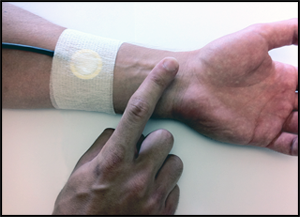This is an ongoing project in which we are applying implicit metrics – derived from recent research in Cognitive Neuroscience – to explore people’s experience of agency when interacting with new technologies, such as on-body and intelligent interfaces.
Publications:
Coyle, D., Moore, J., Kristensson, P.O., Fletcher, P.C., & Blackwell, A.F. (2012) I did that! Measuring Users’ Experience of Agency in their own Actions. ACM CHI 2012, pp 2025-2034. Best Paper Honorable Mention. (pdf) (DOI link)
Limerick, H., Coyle, D. & Moore, J.W. (2014). The Experience of Agency in Human-Computer Interactions: A Review. Front. Hum. Neurosci. 8:643. doi: 10.3389/fnhum.2014.00643
Limerick, H., Moore, J.W. & Coyle, D. (2015). Empirical Evidence for a Diminished Sense of Agency in Speech Interfaces. ACM CHI 2015. pp3967-3970. (pdf) (DOI link)
Summary:
 The importance of control in human-computer interactions is well established. For example, the seventh of Shneiderman’s Rules of Interface Design states that designers should strive to create interfaces that “support an internal locus of control”. This is based on the observation that users “strongly desire the sense that they are in charge of the system and that the system responds to their actions”.
The importance of control in human-computer interactions is well established. For example, the seventh of Shneiderman’s Rules of Interface Design states that designers should strive to create interfaces that “support an internal locus of control”. This is based on the observation that users “strongly desire the sense that they are in charge of the system and that the system responds to their actions”.
In recent years the sense of control – or “Experience of Agency” – has become the focus for a significant body of research in cognitive neuroscience. Within this literature the experience of agency is defined as a person’s innate sense of being in control of their actions and through this control of being responsible for, or having ownership of, the consequences of those actions. Researchers in this field have developed techniques through which the experience of agency can be empirically investigated.
The first publication listed above discusses two empirical techniques for assessing the sense of agency. It then describes two experiments. The first experiment investigated the effect of a change in the input modality of an interaction on user’s sense of agency. It compared traditional keyboard input with a simple skin or body-based input and found that changes in input modality can have a substantial effect on the sense of agency. The second experiment investigated what happens when a computer assists users in achieving their goals. The results suggest that up to a certain point, computers can assist users whilst they still retained a strong sense of agency. Beyond this point users may experience a significant loss in their sense of agency, even if the computer correctly assists them in achieving their goal.
Key collaborators
James Moore
Hannah Limerick
Alan Blackwell
Per Ola Kristennson
Johanna Didion